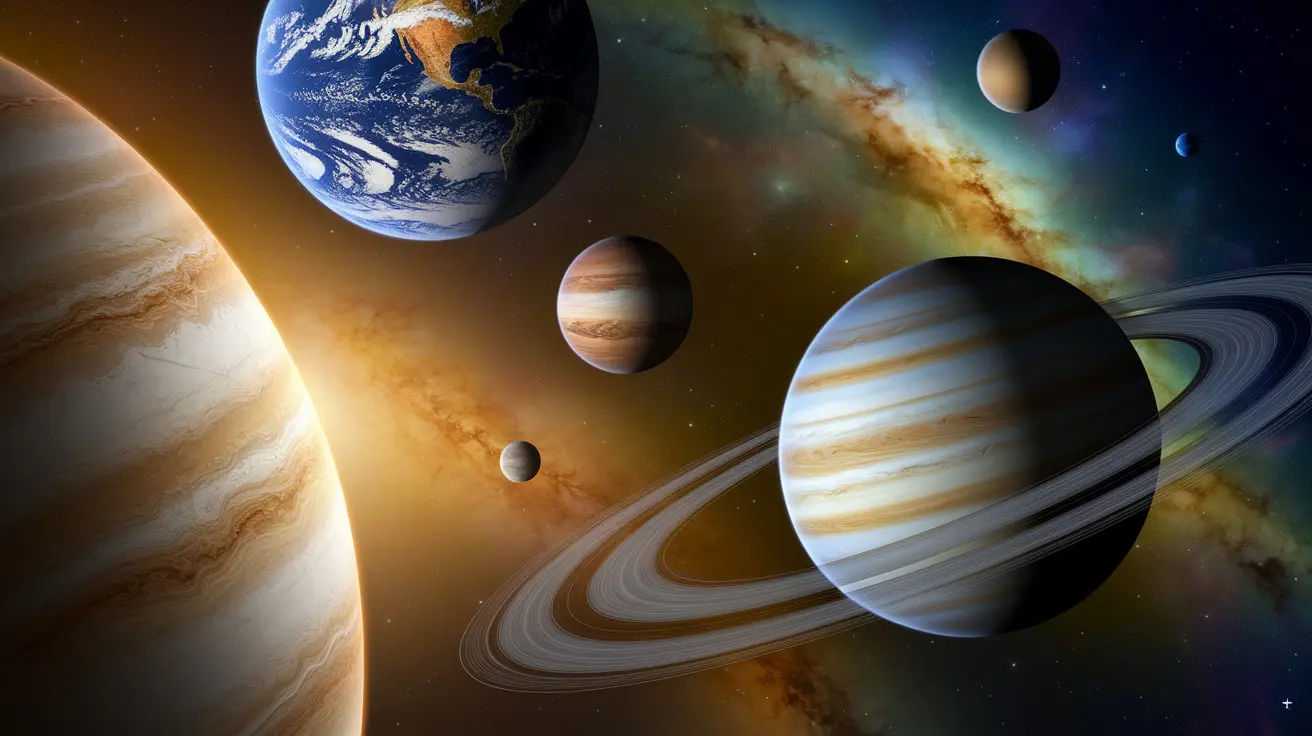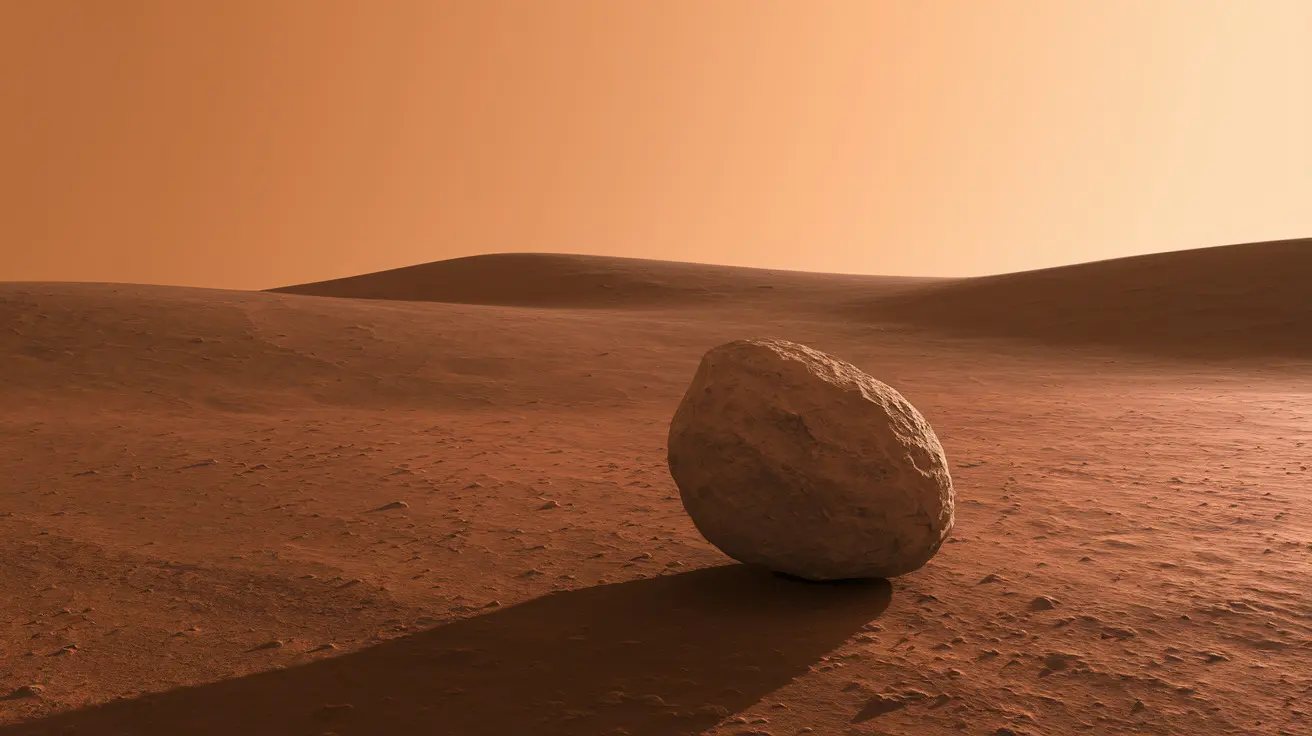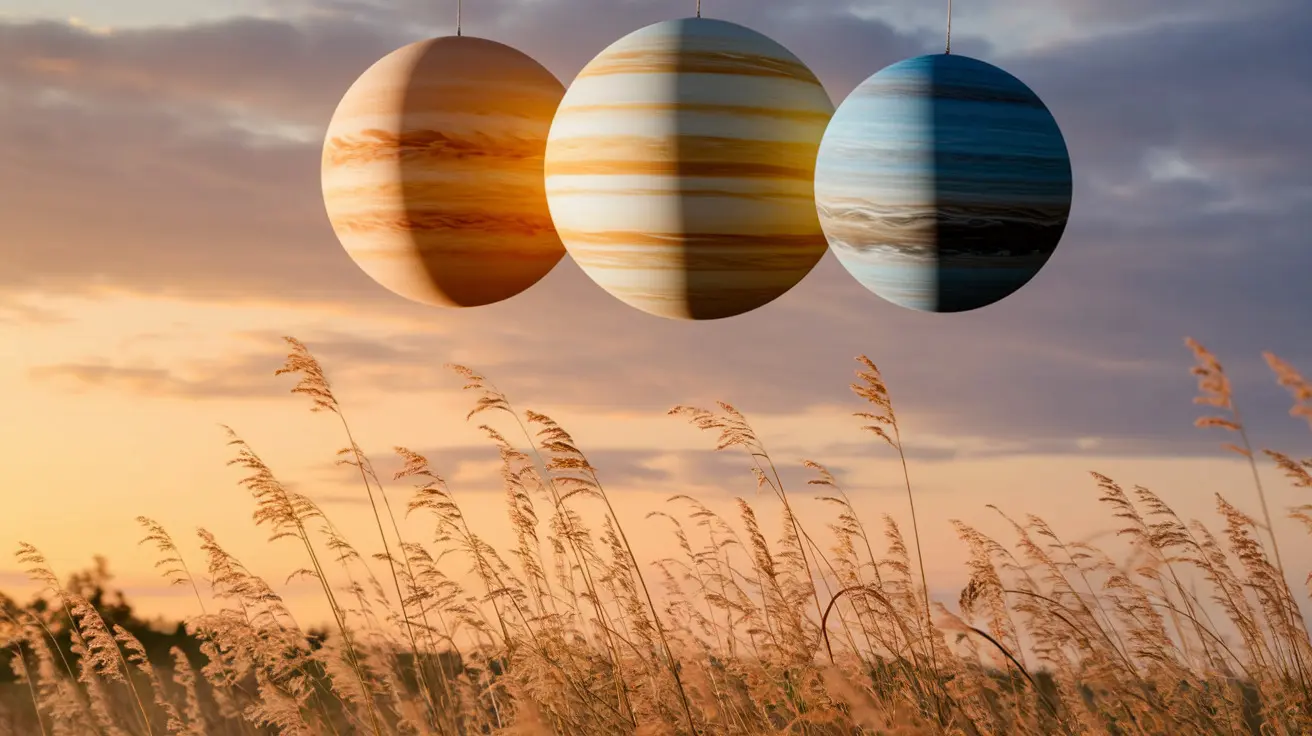
Your Age on Other Planets: A Comprehensive Guide
Discover how old you would be if you lived on different planets in our solar system.

It calculates the time each planet takes to complete one orbit around the Sun, which is called a planetary year. This period changes drastically from planet to planet.
Planets that move quickly around the Sun have short years, while planets that move more slowly have long years. On Earth, a year is 365 days long. This is all thanks to our wacky calendar, which is based on the rate at which Earth rotates on its axis and around the Sun.
Earth's axial tilt gives us our seasons. Like the Earth, each planet has its method of telling time depending on its rotation and orbit. The following section provides a concise side-by-side table to compare these critical facts.
Key Takeaways
- Planetary years - The length of a year is entirely different when comparing the planets. This means that your "age" varies widely based on what planetary calendar you are using!
- Calculating your age on other planets is easy, thanks to online tools. Enter your Earth birthdate and immediately discover how old you are in the cosmos!
- Understanding planetary years deepens your grasp of fundamental astronomy, highlighting the differences in orbits, rotations, and timekeeping across the solar system.
- Planets such as Mercury let you celebrate several new birthdays each Earth year. On Neptune, you could spend your whole lifetime waiting for only one birthday, providing a whimsical and informative look at time itself!
- Understanding breeds curiosity about the universe, which can lead to a lifelong interest in many other science and technology subjects.
- Compare your planetary age with friends and family! We hope you enjoy it and that it inspires new conversations about the nature of space and humanity's unique place in the universe.
What Is A Planetary Year?
Like Earth, a planetary year is how long a given planet takes to orbit once around the Sun. This is sometimes referred to as the orbital period. A day, or rotational period, is the time it takes for a planet to rotate once around its axis. This is very different from your training set.
On Earth, a day is 24 hours long and a year is 365 days long. Other planets have much stranger days and years. For instance, Mercury is spinning so slowly on its axis that one day is nearly 59 Earth days long. However, don't let that size fool you — Mercury moves quickly around the Sun, completing its year in just 88 Earth days.
Saturn, in contrast, takes more than 29 Earth years to travel around the Sun once. These enormous disparities influence the concept of time and age on each planet.
Astrological ages add another layer to this onion. Each period is associated with one of the twelve zodiac signs. As determined from the Great Year cycle of 25,772 years, it would be a long one, approximately 2,147 years. This concept links profound transitions in human society and culture with universal rhythms.
When exactly they should occur is still hotly contested among experts.
Our Home Planet's Calendar
People are familiar with measuring age in Earth years. The beauty of using a planetary year is that age becomes more variable. Tools are available online to enter your date of birth and find out how old you would be on Mars, Jupiter, or other planets.
That's not just a nifty side note. It provides an exciting opportunity to reimagine time and deepen understanding of the solar system.
Cosmic Clocks: Orbits & Spins
To change Earth years to another planet's years, use this formula: Earth age ÷ orbital period of the planet (in Earth years). For example, if you are 24 years old: on Mercury, 24 ÷ 0.2408 ≈ 99.7 years old.
Steps:
- Find your age in Earth years
- Get the planet's orbit period (see table)
- Divide your age by the orbital period
Day vs. Year Explained
Mercury completes one orbit around the Sun in a mere 0.2408 Earth years. That would give you over four birthdays for each Earth birthday, changing our thoughts about age and aging.
If you lived on Mercury, you would experience time passing quickly, at least for years.

Your Age Across The Solar System
The only reason we count age this way is because of the way Earth orbits the Sun. Our birthdays celebrate one complete journey—or orbit—around the Sun. Each planet doesn't go in a smooth loop, and they don't even take the same time to go around their orbits.
Rotation, or the speed at which a planet rotates on its axis, determines the length of a day. These two motions, rotation and revolution, determine how old you would be if you lived on other planets. Check out Thelema's Aeon of Horus to learn more about cosmic epochs.
These cycles deeply determine how we feel and experience time and change! As we look at each planet, we see that age and time are relative. The texture of a day also varies by proximity to the Sun and what's happening right where you are. Read on as we unpack how these considerations work throughout the solar system.
1. The Simple Conversion Math
Mars's year is 1.8809 Earth years long. This is great because your Mars age will be roughly half Earth's. For a 30-year-old on Earth, just under 16 Martian years have elapsed.
Unlike the outer gas giants, Mars has a day, or "sol," much like Earth. It's only slightly longer than Earth's, lasting 24 hours, 39 minutes. As a result of this close match, you would find day-to-day life strikingly similar to Earth—but you'd celebrate your birthday much less frequently.
A Martian calendar would have to accommodate these variations. Where Earth operates on a 365-day year, a Martian year is roughly 687 Earth days long. It would influence everything from the new holidays on the calendar to how people perceive time in their everyday lives.
This idea is in line with changes in cultural age periods. It parallels the transition between Aeons in Thelema, heralding a shift in how women understand and experience time!
2. Mercury: Many Birthdays Fast
That's the equivalent of 482 Mercury days or 482 Mercury birthdays! So you'd celebrate many birthdays—more than four Mercurian years for every Earth year. Mercury has a day longer than its year!
Due to its slow spin and rapid orbit, one day-night cycle lasts around 176 Earth days. This breakneck speed would seriously impact how time feels. Combining a quick orbit and sluggish rotation creates extremely long sunrises and sunsets, lasting several weeks.
Time measured here would go by quickly on Mercury, but a typical day on the surface would be extended and tiring. It's just a demonstration, of course, but it's a good reminder that the numbers alone don't capture the whole experience of time's movement.
3. Venus: A Very Long Year
Venus's year is 0.61562 Earth years—roughly 225 Earth days. Its day, however, is even longer: one rotation takes 243.018 Earth days. That's right—a day on Venus is longer than a year.
Perception of time for any would-be inhabitants would be drastically different. You'd need to wait almost an entire Earth year for the Sun to rise and set again. This tortoise-like rotation results in extreme surface temperature fluctuations.
During the day, it can reach 800 ºF! At night, it plummets to -330 ºF! Aging on Venus would occur slowly due to the planet's extremely slow rotation. Due to its orbital period, birthdays would still come quicker than on Earth.
Venus's slow rotation and quick orbit create a paradoxical combination compared to Earth. It's strange when a day is longer than a year, reversing the familiar cadence of time. Thelema sees the Aeon of Horus as a departure from previous paradigms.
4. Mars: Your Red Twin's Age
Jupiter and Saturn have much longer years: Jupiter takes 11.862 Earth years to make one orbit, and Saturn needs 29.458 Earth years. A 30-year-old Earthling would be only two, just about two and a half on Saturn.
These extensive years are due to Jupiter's much longer orbit around the Sun. Jupiter's immense mass and gravitational attraction determine its languid pace. One day on Jupiter is just 9.92496 Earth hours long, so "days" go by quickly, but "years" take forever!
Time on gas giants would be a very different experience. The rapid rotation creates very short days, but the long revolution creates infrequent birthdays. These extremes produce an environment that causes life—and thus age—to unfold in ways difficult to replicate on Earth.
5. Jupiter & Saturn: Gas Giant Time
Uranus and Neptune are still much more distant. Uranus's year is 84.01 Earth years long. Neptune's is 164.79 Earth years long. For a person who's 30 on Earth, that's barely a quarter of a year on these gas giants.
Time creeps along here on Earth. The cold would define life on these planets, and the slow progression of years would feel dilatory at best. Their orbits are wide, and their days are short compared to Jupiter or Saturn.
The surroundings would warp the feeling of time, beyond the math, beyond your head.
6. Uranus & Neptune: Icy Ages
Pluto, even if you don't count it as one of the "main" planets anymore, still takes 248.54 Earth years to go around the Sun once. One Pluto birthday would equal almost two and a half centuries on Earth.
Timekeeping here is an ordeal, not just for calculating age but for any measure of daily existence. The enormous length of Pluto's orbit would make it very difficult for a human to experience a complete Pluto year.
This provides a radically different understanding of aging and history. It invites you to imagine what it would be like to live and keep time on such a remote planet.
7. Pluto: A Distant Birthday
Just like Earth, each planet spins on its unique clock. Day lengths vary from Mercury's 58.6 Earth days to Jupiter's ten-hour spin. Here is a summary:
| Planet | Day Length (Earth hours) |
|---|---|
| Mercury | 1407.5 |
| Venus | 5832.5 |
| Earth | 24 |
| Mars | 24.6 |
| Jupiter | 9.9 |
| Saturn | 10.7 |
| Uranus | 17.2 |
| Neptune | 16.1 |
| Pluto | 153.3 |
A human's age on different planets changes depending on how far they are from the Sun. It's not just about how close to the Sun a planet is. Age is affected by these realities, but we're talking about everyday life and how it feels.
This has profound implications for anyone thinking of human life beyond Earth.
The Science of Different Ages
In many other parts of the solar system, time flows in confusing and counterintuitive ways compared to life on Earth. Each planet rotates, wobbles, and orbits the Sun in its special fashion. Because of this, a day and a year are not the same from one world to another!
These variations influence how time, seasons, and possibly even birthdays would function if humanity ever came to reside beyond Earth. Axial tilt and a planet's precession—or wobble—are key factors shaping seasonal evolution. On Earth, the tilt provides us with summer and winter.
On planets like Uranus, which tilts nearly completely on its side as it spins, seasons can last for over 20 years. These extensive periods influence how individuals perceive time and age.
Orbital Speed and Distance
No single clock is suitable for all planets. Time is not absolute but relative, based on how quickly a planet travels or its location within the universe.
For instance, Mercury moves around the Sun in only 88 Earth days, whereas Saturn does so in nearly 30 Earth years. If you're 20 on Earth, you'd be over 80 in Mercury years!
In Saturn years, you would be under one. Each planet's unique timescale is dictated by its orbital speed and distance from the Sun.
Each Planet's Unique Day
Days on other planets can be less or more than 24 hours. On Mercury, a day is 1,408 hours—much longer than the 24 hours we're accustomed to.
Saturn's day is only 11 hours long. This fundamentally changes how life and aging are experienced in every part of our planet.
It's a spectacular reminder that time is always local, never global—even in our solar system.
Wobbles and Tilts Matter
Planetary wobbles and tilts affect more than just the seasons. They might even define cultures. When suddenly a year or a season takes much longer, people may begin to celebrate milestones in different ways.
On Mars, with a year nearly double that of Earth's, birthdays and holidays would have to be rethought entirely. This compels us to reexamine how we think about age and time.
No Single "Space Time"
Even a relatively mundane event such as a birthday would take on new meaning. Because each planet's year is different, we would celebrate according to the calendars of various new planets.
So, age becomes malleable, molded by a person's environment. This provides new opportunities to reimagine time and new reasons to rejoice.

Beyond Numbers: Cosmic Perspectives
Learning how old you would be on other planets does much more than intrigue you. It shows how time is laced throughout the cosmos! Age cannot be merely a number linked to anniversaries on Earth. It's a jumping point to bigger questions about how we measure time.
It encourages us to think about why those approaches evolve and how they inform who we are. The universe is about 13.8 billion years old. As scientists such as Wendy Freedman have been keen to report, this vast age provides a cosmic perspective that feels very different from our everyday experience of numbering years.
With each fact you post, you spark curiosity about astronomy and science in general. You bring the subject to life and make it tangible and relevant.
Imagining Time Elsewhere
Most of us imagine aging on other planets, becoming faster or slower. Biological aging doesn't slow down or speed up in real life; it's just our method of tracking years that shifts.
A single "year" on Jupiter lasts almost 12 Earth years, while Mercury lasts only 88 Earth days! Popular culture, particularly science fiction films, tends to obscure this distinction. They claim that relocating to Mars or Saturn could "turn back the clock" or even "stop time," but this is untrue.
The more profound truth lies in how our calendars align with cosmic rhythms, rather than our physiologies.
Celebrating Alien Milestones
Mark your birthday on Mars, and you'd be much younger by the numbers. Your cells would continue to get older at the same pace. The impacts of the planet's gravity, radiation, and general environment would all dramatically modify life expectancy.
That number on the calendar isn't anything more than a funny accident of orbital math. This difference illustrates that age is not just a number—it's a combination of biology, environment, and social factors.
Age: A Cool Science Lesson
To create a calendar for Mars or Venus, you must recalculate leap years and months from scratch. For example, Mars would require an entirely different calendar with many more days each year, plus its leap days.
These timekeeping conundrums illustrate how our experience of time is constructed from the non-universal, local cadences of the world around us. The cosmic background has since cooled to about 2.725 K.
Tools such as large telescopes have helped to uncover important new information about the age of our universe and our place in it.
Busting Planetary Age Myths
Finding out your age on other planets is a fun combination of math, astronomy, and a little cosmic silliness. This exercise makes the faraway concept of planetary years very tangible. Most of us in the science communication field use these calculations to promote curiosity.
They stimulate curiosity in astrophysics, stellar formation, and even the origins of our solar system. The idea is based on actual science. For example, the age of Earth is based on radiometric dating of moon and meteorite samples, indicating that our planet was formed around 4.54 billion years ago.
Researchers estimate the ages of planetary surfaces by counting craters on moons or Mars. In contrast, the radionuclides in moon soil and meteorites align closely with the Sun's age, underlining the scientific rigor behind these fun facts.
Not Biological Aging
It's not calculating how quickly you'll age or how many Earth years are equivalent to one year on those planets. It's pretty simple to do with online calculators. For instance, a 30-year-old person on Earth would be a little over 15 on Mars.
This is because a Martian year is almost twice as long. Initially developed for the UN's International Year of Planet Earth, these tools provide a whimsical yet powerful introduction to planetary data, making dry global statistics incredibly personal.
Users are left shocked and much more curious about how scientists date planets.
Space Calendars & Leap Years
Many age calculators are available online, requiring only your date of birth. Distributing these findings around the office or at home can help stimulate dialogue about astronomy. Though these tools seem straightforward, they hide a deep and sometimes confusing science.
This science is the result of painstaking counting of craters and analysis of meteorites.
Just Fun With Physics
Turning to the other side of the equation, considering cosmic time shifts, we must reflect on how we should view space exploration. Knowing how planetary ages are dated, like Mars' Hesperia Planum study, prompts more profound questions about time, including the planet's year length and our place in the cosmos.

Become A Solar System Local
Asking questions and wanting to explore has taken us from our world to worlds beyond our own. For many in tech and science, the solar system is more than just a collection of faraway rocks. It's a fertile ground for lived experience, fresh inquiry, and an opportunity to examine existence on a much larger scale.
The time of our solar system is controversial. Some, citing biblical texts, claim it is only 6,000 years old. Using techniques such as radiometric dating, others have discovered evidence indicating an age closer to 4.6 billion years. These contrasts reveal how cultural assumptions and scientific premises influence our perceptions of the cosmos.
Try An Age Calculator
One way to ground this curiosity is to use an age calculator, such as age-master.com. These nifty calculators illustrate how your age would measure up on Mercury, Jupiter, or Neptune. They consider each planet's orbital period, too!
For instance, a person who is 30 Earth years old would only be around 3.9 years old if they lived on Saturn. Calculators like these use real astronomical data, including cycles described in Milankovitch cycles, to give a sense of time outside Earth's norms.
Age Unlocks Space Wonders
Contemplating aging on these alternate worlds reminds us of how deeply our understanding of time is rooted in our planet's orbital cycle. The Great Year, the time for the equinoxes to finish a complete cycle (almost 25,800 years), reminds us that our timekeeping is linked to shifting cosmic patterns.
Earth's axis, for instance, makes a slow circle, and its alignment with Polaris is only temporary. These realities anchor our everyday existence in a much deeper narrative.
Your Cosmic Neighborhood Awaits
Learning your "cosmic age" helps you realize that you are part of a much larger system, akin to the rotation speed of celestial bodies. It's a beautiful reminder that our place in the universe is dynamic and ever-evolving, much like the motion of planets around their orbital paths.
Conclusion
Age operates differently on each planet. On Mars, you'd be young enough to be born yesterday. On Jupiter, you'd hardly live to see one birthday. The solar system serves up a whammy to our understanding of time. These realities, in turn, provide new opportunities for thinking about age and space. So next time a birthday comes, see if you can calculate how many trips you took around Saturn or Mercury. It generates essential conversations about science, our role in the universe, and how we value life. To learn more, look at the age calculators available online! You can also let us know your favorite planet by leaving a comment! We'd love to continue the discussion with you on this crazy journey through space and time.

Frequently Asked Questions
How do you calculate your age on other planets?
How do you calculate your age on other planets? Next, divide that number by the planet's orbital period — how long its year is in Earth years. Since each planet takes a different amount of time to complete its orbit path around the Sun, your age will vary from planet to planet.
Why is a year different on each planet?
What is a year, and why is it different on each planet? Each planet has a unique orbital period because planets orbit the Sun at varying distances and speeds.
Which planet would make me the youngest?
Jupiter has the next-shortest year after Earth, just shy of 12 Earth years. That's why your "Jupiter years" will be smaller than on almost any other planet.
Does my actual age change on other planets?
Does my real age go up on other planets? The only change is how many "planet years" you've completed, which depends on the planet's year length and how long each planet takes to orbit the Sun.
Why do scientists care about planetary years?
Why do scientists care about planetary years? Scientists adopt planetary years to compare time, understand planetary motion, and inform mission planning, particularly regarding celestial bodies' rotation speed and orbital path. This brings us closer to understanding the Solar System around us.
Is there a planet where I'd be much older?
Indeed, on Mercury, you'd be the oldest. Its planet year length is just under 88 Earth days, so you'd celebrate many more birthdays there than on Earth.
Can knowing my age on other planets help me learn about space?
Yes! Using a birthday paradox calculator to determine your age on different planets is a fun way to learn about orbit paths, astronomy, and our place in the Solar System.
Published by Age-Master.com